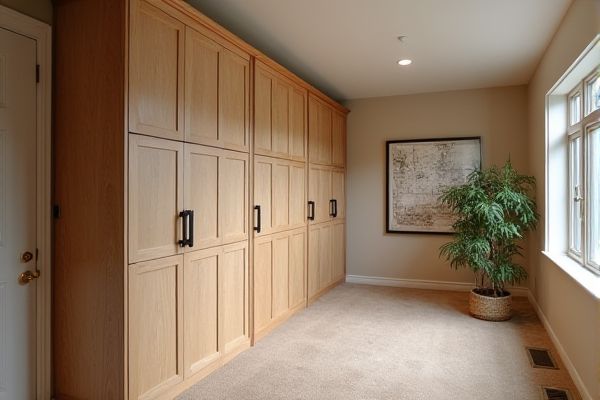
Built-in cabinetry offers a seamless, custom fit ideal for maximizing basement space with a polished, permanent look, while modular storage provides flexibility and easy rearrangement to accommodate changing needs. Discover which option best suits your basement design and storage goals by reading the full article.
Table of Comparison
| Feature | Built-in Cabinetry | Modular Storage |
|---|---|---|
| Customization | Fully customized to space and style | Flexible but limited to pre-designed modules |
| Installation | Permanent, professional installation required | Quick, easy to install and rearrange |
| Cost | Higher initial investment | Affordable and budget-friendly |
| Durability | Long-lasting, high-quality materials | Varies, generally less durable |
| Space Optimization | Maximizes every inch of basement space | Good but may leave unused gaps |
| Design Options | Unlimited design and finish choices | Limited styles and colors |
| Maintenance | Low maintenance, easy to clean | Depends on material, may require frequent upkeep |
| Resale Value | Increases home value | Minimal impact on value |
Understanding Built-In Cabinetry: Definition and Features
Built-in cabinetry refers to custom-designed storage solutions permanently integrated into the architecture of a basement, offering seamless functionality and aesthetic appeal. These fixtures are typically crafted from durable materials like hardwood or plywood, tailored to maximize space utilization and complement the existing interior design. The key features include flush installation, customized compartments, and long-lasting durability, distinguishing them from modular storage systems that provide flexible, movable units.
What Is Modular Storage? Key Characteristics
Modular storage refers to customizable, prefabricated units designed for flexible organization and easy installation in basement spaces. Key characteristics include adjustable shelves, interchangeable components, and the ability to expand or reconfigure units based on changing storage needs. Unlike built-in cabinetry, modular storage offers versatility and portability, making it ideal for dynamic basement environments.
Space Efficiency: Built-In Cabinetry vs Modular Storage
Built-in cabinetry maximizes space efficiency by utilizing every inch of available basement wall and corner areas through custom measurements, reducing dead zones and providing seamless storage integration. Modular storage offers flexible space configurations with adjustable shelves and stackable units, catering to changing storage needs but often leaving gaps or unused spaces between modules. Choosing built-in cabinetry typically results in higher storage capacity per square foot compared to modular systems, ideal for basements with irregular layouts or limited space.
Design Flexibility and Customization Options
Built-in cabinetry offers tailored design flexibility with precision fitting to basement dimensions, enabling seamless integration with existing architectural features and personalized storage configurations. Modular storage systems provide adaptable customization through interchangeable units that can be easily reconfigured or expanded to accommodate changing needs and varying items. Both options optimize space utilization but differ in permanence and ease of modification, catering to distinct design preferences and functional requirements.
Installation Process: Built-In vs Modular Solutions
Built-in cabinetry requires custom measurements and professional installation, ensuring a seamless fit tailored to the basement's unique dimensions, which often involves longer lead times and higher labor costs. Modular storage solutions offer pre-fabricated components that enable quicker assembly and easier adjustments or relocation, making them ideal for flexible or budget-conscious projects. The choice between built-in and modular depends on the desired permanence, customization level, and installation complexity for basement storage.
Cost Comparison: Budgeting for Basement Storage
Built-in cabinetry typically involves higher upfront costs due to custom design, materials, and professional installation, making it a premium option for basement storage. Modular storage systems offer a cost-effective alternative with flexible pricing based on size and components, suitable for budget-conscious homeowners. When budgeting for basement storage, consider long-term value, durability, and potential resale impact alongside initial expenses.
Durability and Maintenance Requirements
Built-in cabinetry in basements offers superior durability due to its custom installation and use of high-quality materials tailored to the space, ensuring long-term structural integrity. Modular storage systems typically use prefabricated components that may be less resistant to moisture and wear but allow for easier maintenance through interchangeable parts. Maintenance for built-in cabinetry usually involves occasional refinishing or repairs specific to the wood or materials used, while modular storage requires regular cleaning and part replacement to maintain functionality.
Aesthetic Appeal: Matching Your Basement Style
Built-in cabinetry offers a seamless, high-end aesthetic that integrates perfectly with your basement's architectural features, creating a cohesive and custom look. Modular storage provides flexible design options that can be tailored to complement various styles, from modern to rustic, allowing for easy updates as trends change. Choosing between them depends on whether you prioritize a permanent, polished finish or adaptable, style-matching storage solutions.
Resale Value Impact: Which Option Increases Home Worth?
Built-in cabinetry typically enhances your home's resale value by providing custom, high-quality storage solutions that appeal to buyers seeking permanence and craftsmanship. Modular storage offers flexibility and affordability but may not contribute as significantly to long-term property worth due to its temporary and customizable nature. Investing in built-in units often leads to a higher return on investment by increasing the functional appeal and overall aesthetic of your basement.
Choosing the Right Storage Solution for Your Basement
Built-in cabinetry offers a seamless, custom fit that maximizes basement space while adding value through tailored design and durability. Modular storage provides flexibility and easy reconfiguration, ideal for changing storage needs or rental properties. You can optimize your basement's functionality by assessing your space, budget, and long-term usage to determine which storage solution best supports your lifestyle.
 homyna.com
homyna.com